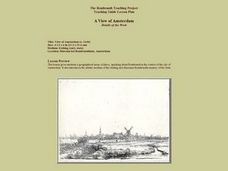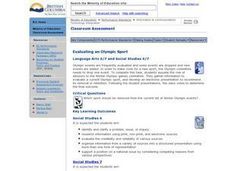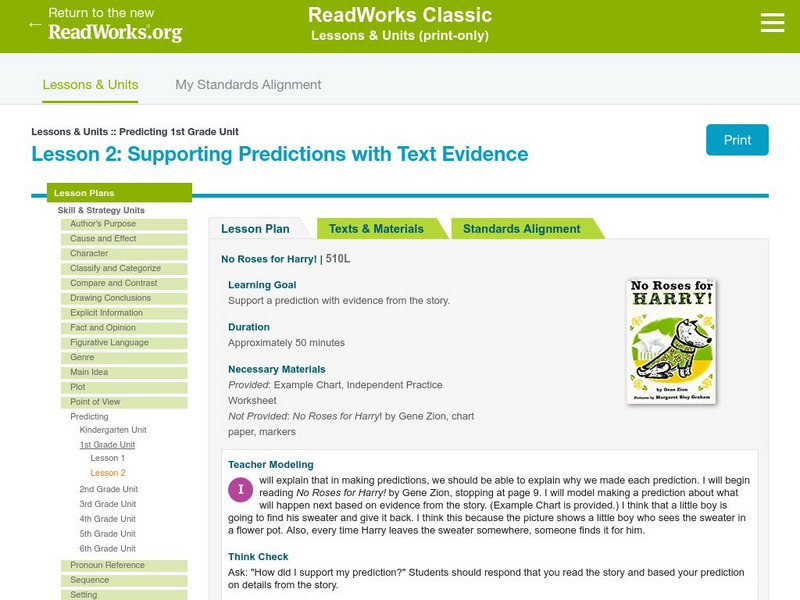Curated OER
WEATHER SATELLITE PREDICTION PROJECT
Learners compile weather satellite data from three satellites for one month, obtain weather reports and data from professionals, then create a document with predicted results.
Curated OER
Digging Deeper: Mission San Sabá
Seventh graders view a painting of the destruction of Mission San Saba in Texas. They discuss the painting and identify information that they can infer from the painting.
Curated OER
Mineral Replacement in Fossil Formation
Fourth graders explore fossils and how they are formed. They create their own "fossils" out of plaster of Paris. They record their findings in their science journals.
Curated OER
A View of Amsterdam
High schoolers are introduced to the process of etching during Rembrandt's time. Using a painting of Rembrandt, they answer questions related to it and how the painting makes them feel. They define and demonstrate perspectives and...
Curated OER
Following a Monster
Students follow tracks of a monster who has walked through their classroom to see what he has done. They discuss sequencing vocabulary before using computer software students sequence the monster's visit using a concept map. In a word...
Curated OER
The Right to Vote
Students are provided a form for learner to read and discuss several ways people have been prevented from voting. Students relate what they know and discovered about voting rights for different population of people. They establish a...
Curated OER
Evaluating an Olympic Sport
Students research the political context of the Winter Olympics in general and within certain countries in particular. They read authentic, published articles on the topic from the Internet and add this information to the spreadsheet as...
Curated OER
Social Studies: How Did Native Americans Live?
Fifth graders examine Edward Curtis' photographs and Robert Griffing's paintings to analyze Native American culture. They present research information on specific tribes, using the photos and paintings to uncover information about the...
Curated OER
Poetic Expression
Ninth graders evaluate the effectiveness of literary techniques including figurative language.
They demonstrate an understanding of the main ideas, events, or themes of a variety of novels, stories, poetry, other print material, and...
Curated OER
Looking at the Community Tree
Third graders review the characteristics of living and nonliving organisms. As a class, they observe a tree and describe the interactions between the living and nonliving organisms surrounding it. To end the lesson, they ask a question...
Curated OER
East Asia: Current Events
Ninth graders read and evaluate current events of East Asia. They select an article, read and summarize the article and identify the key people, places, dates, and events in the article. As they summarize, they write a personal...
Curated OER
Metal Composition & the U.S. Mint
Students study the meaning, symbolism, and value of U.S. coins,
especially the quarter. Theyresearch why in 1965 the U.S. Mint decided to
change the metal composition of the quarter to copper coated with nickel.
In addition, they perform...
Curated OER
Designing Models to Simulate Actual Events Using a Table of Random Digits
Students design models to simulate actual events using a tale of random digits. They estimate the likelihood of a particular outcome using results of simulation. Students investigate the uses of statistical methods to analyze data.
Curated OER
Interpreting Photos Checklist
For this interpreting photos checklist worksheet, students use the checklist to self-evaluate their presentation on the family photograph. The checklist is also used by the student's peers and teacher.
Curated OER
Testing Weather Proverbs
Students study weather proverbs. In this weather lesson, students list weather proverbs and complete the worksheet to test the proverb. Students design an experiment to test the weather proverbs and conduct the experiments.
Curated OER
Heat Transfer and Pollution
Learners perform computer simulations on air dispersion. In this chemistry lesson, students calculate energy transfer based on specific heat and temperature change. They explain the causes of smog.
Khan Academy
Khan Academy: Strongly Supported Inferences Quick Guide
A quick guide to approaching questions that ask you to identify something that is "strongly supported." On questions that ask you to find the choice that is most strongly supported by a stimulus, the answer does not have to be...
Khan Academy
Khan Academy: Strongly Supported Inferences Learn More
How do we recognize what is "strongly supported?" Some questions on the logical reasoning section of the LSAT ask what additional information is supported by a stimulus. These are similar to questions that ask you to identify the...
Curated OER
Mc Graw Hill: Part 2 Reading: Informational Text: Quote Accurately
Learn about quoting accurately and making inferences on this site. A link provides a model with text and supported inferences.
E Reading Worksheets
E Reading Worksheets: Inferences Worksheets
In this learning module, students will learn more about making inferences. Worksheets are provided to reinforce the skill of making inferences. This module is designed to support Tier I, Tier II, and Tier III students.
Reading Rockets
Reading Rockets: Strategy Guide: Teaching How Scientists Make Inferences [Pdf]
This guide includes an introductory section about visual evidence, a general overview of how to use this strategy with many science texts, and a plan for teaching how to use visual evidence to make inferences with the Seeds of...
Khan Academy
Khan Academy: Inferences About Information Quick Guide
Some questions in the Reading Comprehension section will ask you to make an inference about information in the passage. The answer may not be explicitly stated in the passage, but it will be supported by the content of the passage. In...
Polk Brothers Foundation Center for Urban Education at DePaul University
De Paul University: Center for Urban Education: I Can Infer Character Traits and Support [Pdf]
Students can use this graphic organizer while making inferences about characters in a story or history text. Students will collect text evidence in the chart to support their character trait inferences.
Read Works
Read Works: 1st Grade Unit: Supporting Predictions
[Free Registration/Login Required] A lesson utilizing the book No Roses for Harry! by Gene Zionin in which students make a prediction and then support it with details from the text. Ideas for direct teaching, guided practice, and...























